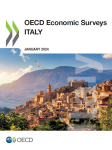OCDE (Paris, France). (2024). OECD Economic Surveys: Italy 2024. Paris (France) : OCDE. 119 p. (Etudes Economiques de l'OCDE). Version française abrégée uniquement.
https://doi.org/10.1787/78add673-en
https://doi.org/10.1787/78add673-en
| Titre : | OECD Economic Surveys: Italy 2024 |
| in : | |
| Auteurs : | OCDE (Paris, France) |
| Type de document : | Série |
| Editeur : | Paris [France] : OCDE, 2024 |
| Collection : | Etudes Economiques de l'OCDE, ISSN 0304-3363 |
| ISBN/ISSN/EAN : | 978-92-64-38154-4 |
| Format : | 119 p. |
| Note générale : | Version française abrégée uniquement |
| Langues : | Anglais |
| Langues du résumé : | Anglais |
| Catégories : |
Catégories principales 03 - POLITIQUE ET THEORIE ECONOMIQUE ; 3.3 - Politique et Situation EconomiquesThésaurus IAMM ITALIE ; DONNEE STATISTIQUE ; SITUATION ECONOMIQUE ; POLITIQUE ECONOMIQUE ; DEPENSE PUBLIQUE ; ENERGIE ; CLIMAT |
| Mots-clés: | TRANSITION ECOLOGIQUE |
| Résumé : | Italy has weathered recent crises well. A strong fiscal policy response, enhanced competitiveness and improved banking sector health have supported growth in recent years. But public debt is high and spending pressures are rising from population ageing, higher interest rates, and the green and digital transitions. A steady fiscal consolidation is needed over several years to put debt on a more prudent path. Growth in spending needs to be contained, but public investment in the National Recovery and Resilience Plan should be protected to minimise adverse effects on growth. The ongoing civil justice and public administration reforms will support growth by raising business investment and facilitating the implementation of public investment plans. Regulatory barriers to competition in services should be reduced. Raising employment, including by expanding access to early childhood education to reduce barriers to female labour market participation, would make growth more inclusive. Additional policy efforts are needed to accelerate the reduction of greenhouse gas emissions and adapt to climate change. Renewable power generation has advanced, but complex permitting procedures that hold back the installation of renewable energy capacity need to be simplified. |
| Cote : | En ligne |
| URL / DOI : | https://doi.org/10.1787/78add673-en |







